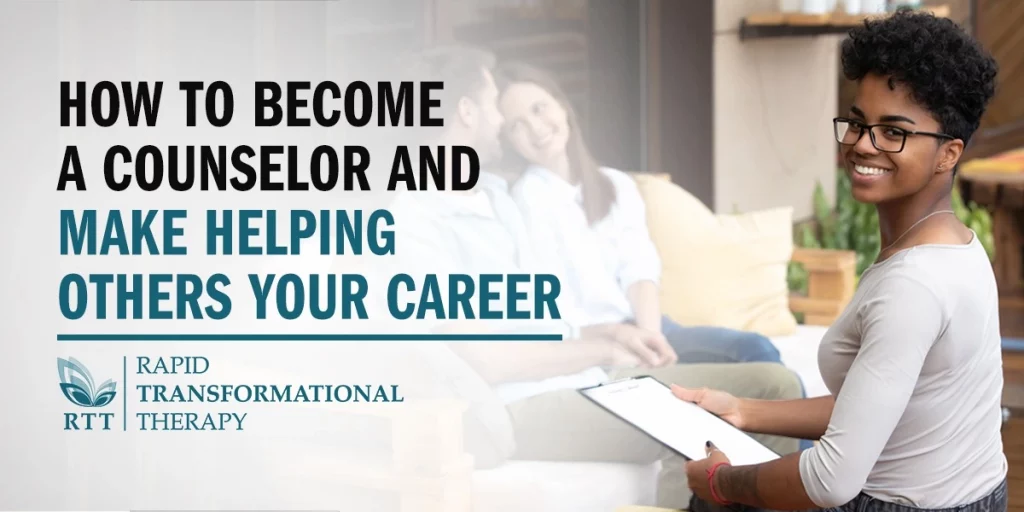Some people feel it in their bones that their life purpose is to help others. If you have been the one everyone comes to for advice ever since your childhood, maybe it is time to consider making counseling your career. Becoming a counselor can give you a sense of alignment with your deepest values.
In this article, you will find all the information about how to become a counselor and the next steps you can take to enter this rewarding career!
You will discover:
- What is counseling and what do counselors do?
- What are the different types of counseling?
- How much do counselors make?
- What are the requirements for becoming a counselor?
- How long does it take to become a counselor?
- How much much does it cost?
- How do I become a counselor without a degree?
What Is A Counselor Exactly?
There are several specializations in counseling, as we will explain shortly. However, all counselors are helping professionals with a minimum of a graduate degree in counseling.
According to the American Psychological Association (APA), a counselor is a person who “provides professional evaluations, information, and suggestions designed to enhance the client’s ability to solve problems, make decisions, and effect desired changes in attitude and behavior.” Let’s apply this definition to real life.
What does a counselor do?

Counselors help people, but how do they do that?
Counseling is professional assistance in helping individuals (and groups) cope with a wide array of difficulties.
When a person sees a counselor, they might expect a helping hand with their emotional problems or issues in their relationships. A counselor can also assist the client pick the perfect school or profession. Or, when a person goes through a life-crisis because of an illness, accident, or a new stage in life (such as retiring), a counselor is equipped to help them transition and accept the changes that come with these events.
In short, if you are thinking about becoming a counselor, expect to learn how to listen to others and put yourself in their shoes. You will be administering tests and asking meticulously designed questions.
Based on your expertise, you will then offer your clients guidance and advice. You will be providing insights into how to best resolve their issues. Most importantly, you will be there to support and encourage them.
How much do counselors make?
Counselors in the US earn between $30,000 and $52,000 a year, according to the Bureau of Labor Statistics. Educational (school) and career counselors earn close to $56,000, while rehabilitation counseling pays an average of $36,000 annually. In the UK, counselors earn an average of £31,000 a year.
Your earnings will depend on several factors. First of all, it is the specialization you are considering, as well as your location. Of course, your experience and the ability to market your services, as well as your willingness to further your knowledge, all add towards a higher paycheck.
Whatever your specialization may be, you can open up your private practice as a licensed counselor. This career path opens up the doorway to many opportunities that you would not have otherwise. You can organize your time as you see fit, pick your clients and your niche, and set your prices. The internet allows you to hold online counseling sessions for people around the world.
However, if you decide to be self-employed, you need to be prepared to handle the additional burden of becoming an entrepreneur. Yet, if you are willing to dive into the entrepreneurship waters, you may also achieve a 6-figure private practice in the field.
What Are The Different Types Of Counselors?

Counseling can be understood as an umbrella term for professionals of diverse specializations. This vocation, for example, encompasses counseling people who were diagnosed with a mental disorder. However, it also includes non-clinical forms of helping others navigate through life, such as career or school counseling.
What they all share is the mission to empower others and support them on their path towards becoming the best version of themselves.
If you are thinking of how to become a counselor, it is important to understand what are the different types of counseling and decide which one interests you the most.
Here are a few of the most popular specializations in counseling.
Mental health counselor
Mental health counseling is a profession with the most considerable overlap with psychotherapy. Sometimes, the only difference is in the paradigm (wellness-orientation as opposed to illness-orientation), or the technical issues (brief intervention as opposed to longer treatments often used in psychotherapy).
If you decide to become a mental health counselor, you will be helping individuals with a mental health disturbance, as well as their close ones, to find lasting solutions for their issues.
Mental health counselors earn an average of $44,000 a year, according to the U.S. Bureau of Labor Statistics’ 2018-19 Occupational Outlook Handbook.
Substance abuse counselor
Substance abuse counseling is a subspecialization of mental health counseling. It may be one of the more challenging and emotionally demanding counseling roles. However, it is that much more fulfilling.
As a substance abuse counselor, you will be helping those at risk of developing an addiction, those already addicted to drugs or alcohol, as well as their families.
Substance abuse counselors make an average of $38,000 annually.
Marriage/relationship counselor
Marriage counselors help with issues that put a strain on a relationship, such as conflicts, concerns arising from infertility, infidelity, domestic violence, and others. The focus is on the family, but they also work with individuals to help them cope with the causes and effects of problems in their relationship.
This type of counseling career is expected to grow by 23% through 2026, which is much higher than the expected average growth of 7% for all professions combined.
Marriage counselors earn an average of $50,000 a year, according to the U.S. Bureau of Labor Statistics’ 2018-19 Occupational Outlook Handbook.
Child (youth) counselor

Child counselors work with children who are experiencing a mental health disturbance. It can be a mild dysfunctional reaction to ordinary life situations, such as when a child becomes overly anxious about going to school.
However, a child counselor also helps children who suffer from more severe mental issues, such as an autism spectrum disorder. They also work with the child’s family to provide overall improvements in the child’s life.
The median salary for child counselors is $38,000 in the US.
School counselor
School counselors help children and youth throughout their education. In other words, as a school counselor, you may expect to work with very young children, as well as college students.
If you pick this career, you will be assisting children and youth in coping with all sorts of issues, such as problems with their parents, troubles with the curriculum, or fitting in. You will also be helping them choose the direction of their further education and career.
School counselors earn an average of $56,000 a year, according to the U.S. Bureau of Labor Statistics’ 2018-19 Occupational Outlook Handbook.
Career counselor
A career counselor is a person whose work is to help people determine the perfect profession for them. Be it a young person about to enter the workforce for the first time, or a seasoned adult who wants to change their career, you will be there to aid the process.
As a career counselor, you will interview the client, administer tests, and explore the perfect match between their passions and skills and the available professions.
Same as school counselors, the U.S. Bureau of Labor Statistics’ 2018-19 Occupational Outlook Handbook reports a medium yearly salary of $56,000.
Rehabilitation counselor
As a rehabilitation counselor, you will be invited to employ your skills in devising ways for your clients to overcome challenges that come with a physical, mental, or emotional disability.
Your work may involve supporting clients in diverse areas of life, such as selecting an appropriate career, overcoming stigmatization, or thinking of practical measures to help people with disabilities live a fully accomplished life.
As a rehabilitation counselor, you may expect to be earning an average of $35,000 a year, according to the U.S. Bureau of Labor Statistics’ 2018-19 Occupational Outlook Handbook.
What Are The Requirements For Becoming A Counselor?

Counseling is a profession that comes with a massive responsibility. You are providing advice and guidance. In a way, you are often responsible for how your client’s life is going to develop from that point on. For that reason, it is one of the strictly regulated vocations requiring college education and a license to practice.
How long does it take to become a counselor?
The length of your studies will depend on several factors. The first is your choice between online and traditional classroom programs. On-campus studying is usually quicker because of the set deadlines and motivation to graduate at the same time as your group, although you can also complete an online program at the same pace.
Other factors include specific requirements of each of the programs, as well as state-by-state variations. For example, at some schools, you will have to complete a practicum, which may range between 500 and 1000 hours.
Some programs require an internship, some do not. The number of supervised hours required to get your license varies between 2,000 and 4,000, which translates into a significant difference in time dedicated to acquiring your degree.
All in all, you can expect to spend anywhere between a minimum of six to twelve years of study to become a counselor.
How do you earn a counselor’s degree?
To become a counselor, you will need at least a bachelor’s degree with most people choosing to complete a master’s level degree. A Ph.D. is not required, but it does provide you with greater depth and width of competencies and, therefore, greater career opportunities.
There are different programs with different requirements, as well as an option to study online. This means you will be able to select the path towards becoming a counselor that works best for you.
Here are the basic steps towards making counseling your career:
Step 1. Complete an undergraduate program
Although studying psychology at this level will give you the best foundations, it is not a must. You can apply for a master’s level program having completed undergraduate studies in most other fields.
Typically, gaining a bachelor’s degree will take you four years.
Step 2. Acquire a master’s level of education in counseling
When you get to your master’s program, you will need to pick your specialization. There are many programs available. So, take your time to learn about the courses in each as well as the application of the acquired title and knowledge after graduation.
You can expect to invest another two to three years to get your master’s degree.
Step 3. Optionally, complete a doctoral program
You can enter a doctoral program right away or decide to further your knowledge after a few years of practice. A Ph.D. will provide you with potentially increased opportunities in academia, and greater career opportunities with a higher salary in general.
Step 4. Get licensed and start practicing
To begin your practice after you have acquired a degree, you will need to get a license. It is best to research information about the licensing requirements specific to your region.
In most cases, you will be expected to pass a state-recognized exam. Sometimes, you will also need to complete supervised practice prior to the test.
After you have completed all the steps, you will become eligible to start practicing – and start helping those in need of your assistance.
Look for an accredited program

Accreditation means that you are acquiring knowledge and skills that are up to the highest professional and educational standards. Moreover, if you decide to transfer between schools, your credits will be accepted by another school.
In counseling, look for CACREP and COAMFTE accredited degree programs. COAMFTE stands for Commission on Accreditation for Marriage and Family Therapy Education, and CACREP stands for Council for Accreditation of Counseling & Related Educational Programs. Both of these accreditation institutions make sure that the curriculum of the programs fits the necessary standards for the future profession.
If you want to enroll in a traditional classroom program, you can look for local accredited universities that offer degrees in counseling. There are also accredited institutions that offer quality education and degrees in counseling online, Capella University and Walden University being amongst the most trusted ones.
How much will it cost you to become a counselor?
The exact price will vary based on the path you select. However, you can expect to pay between $10,000-$26,000 for public school’s bachelor’s degrees (and between $16,000-$35,000 for private schools).
Average yearly tuition in public schools for a master’s program is close to $9,000 and $11,000 for doctoral studies. Be sure to explore financial aid options, both for online and traditional classroom programs.
How To Become A Counselor Without A Degree

Unfortunately, it is not possible to become a licensed counselor without a degree. However, you can still help others in similar settings. There are other options for helping professions to explore.
Depending on your preferences, you can become an assistant or a technician who works alongside licensed psychologists or counselors. For example, you can be an assistant in social and human services. Or, in some cases, you will be able to work as a substance abuse and behavioral disorders counselor with certification only.
If you are interested in working with children and youth, you may want to explore the career of a teacher assistant. In this case, you would be helping disabled or students in special education.
Finally, if you are inclined towards clinical settings, you can work as a psychiatric technician, a role for which you do not need a degree.
If you want a more responsible and hands-on role than that, you can take a look at the careers of a life coach or NLP practitioner.
You can also consider the benefits of becoming a Rapid Transformational Therapy® (RTT®) practitioner. RTT is a method that combines psychotherapy, NLP, hypnotherapy and other techniques to help individual clients with a wide range of life issues.
Marisa Peer, a world-renowned author and therapist, dedicated decades to perfecting her method and is now teaching others how to do it. With RTT, you do not need to spend years and tens of thousands of dollars on schooling. Download the free RTT Course Prospectus to learn how in a matter of months you can start your new career assisting people to overcome different hurdles in their lives.
As part of the training course, Marisa Peer is also offering live training elements, where you get the chance to meet her in person and practice your skills with the help of her expert training team. This hypnotherapy training is available at a variety of locations, including London, Florida, and California.
Is Becoming A Counselor Right For You?
Counseling is a rewarding career. However, it is highly demanding, too. Burnout is common among counselors, probably due to the burden of fighting the clients’ battles alongside them. Compassion fatigue comes as a result of the stress of witnessing your clients’ struggles. You may sometimes also face frustration by a lack of progress.
Additionally, clients have pretty firm expectations of what makes a good counselor, and you might feel the pressure of their preconceptions. “Don’t take your work home” may be much easier said than done, if you pick a counseling career.
Yet, research demonstrated that you could overcome the adverse effects of sometimes harsh work circumstances. If you are motivated by values such as altruism and a wish to contribute to a better world, then seeing the progress your clients are making can override the difficulties of the job.
Answer The Calling To Make A Change
Are you willing to invest the needed time, effort, and money to become a counselor? Or do you want to try a quicker but equally rewarding alternative, such as the Rapid Transformational Therapy® (RTT®)? Download for a free RTT Course Prospectus and discover how RTT can help you become a therapist and start helping people in a matter of months!


